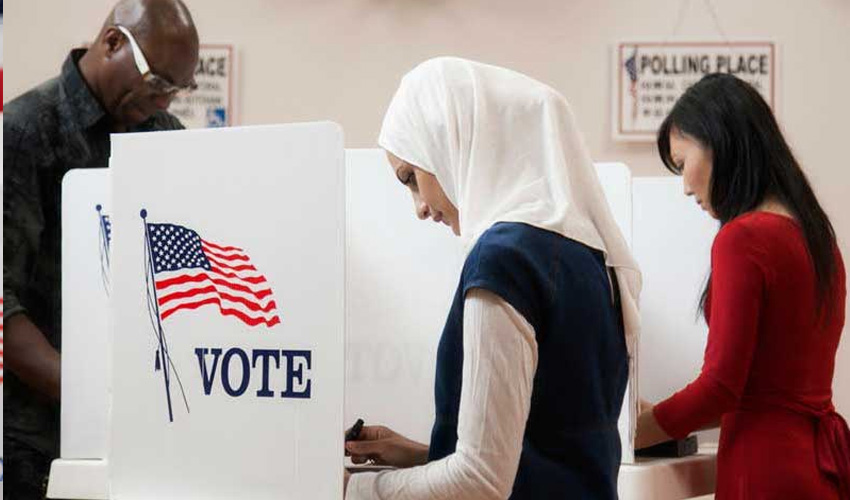As the 2024 US presidential election approaches, the emerging Muslim American vote has become a force to be reckoned with. In key swing states where Democrats won by close margins in 2020, Muslim Americans make up an important and potent voting block.
Of course, the current war in Gaza has made that issue front and center this election cycle. With President Joe Biden and Vice President Kamala Harris struggling to gain some traction each wonders: who will capture the hearts of Muslim voters this election cycle, Donald Trump or Kamala Harris?
It has rapidly become one of the key demographics in U.S. elections, especially within swing states like Michigan, Pennsylvania, and Arizona. This recent growth will be demonstrated through polling data, which reflects a big change in voter sentiment from past elections. A new survey from the Rainey Center suggests that Donald Trump's position with Muslim American voters has strengthened from the 2020 election, while Vice President Kamala Harris struggles to hold her own with this constituency.
The "Abandon Harris" campaign
But perhaps the most striking development in the lead-up to 2024 is the "Abandon Harris" campaign. Kicked into overdrive by Harris's recent stance on the Gaza conflict, the push to mobilize Muslim American voters against Kamala Harris has condemned Harris for backing policies they say perpetuate the violence in Gaza.
The campaign's social media statement criticized Harris for what they perceive to be weak responses to the crisis, reflecting deeper dissatisfaction with the current administration's approach to the Israel-Hamas conflict. That frustration is important because it shows that there is increased disgruntlement among the Muslim American electorate that their issues are not being addressed by Harris or the Biden administration.
Polling data: Trump vs. Harris
The recent polling data underlines the lean of Muslim American voters as the election draws near. It was from the survey carried out by the Rainey Center that almost a third of Muslim American voters now support Donald Trump-a growth from 23% in 2020. This trend arguably indicates that more Muslim voters are opening up to Trump as an option, despite the controversies and some policies witnessed in his first term.
A contrast to this would be the fact that Vice President Kamala Harris is expected to receive 62% of the Muslim vote, according to the same survey. Not by any stretch of the imagination is the support overwhelming. The survey points out the dramatic shift from the 2020 election, when a greater percentage of Muslim voters went for Joe Biden. The data also show a hypothetical six-way race-where Harris would trail behind Biden with 56 percent of Muslims voting for her, where 25 percent would go for Trump.
Key concerns among Muslim voters
The poll commissioned by the Rainey Center brings to the surface the most salient issues among Muslim American voters. The Gaza conflict remains at the top of the list, but that doesn't mean other issues are unimportant. According to the survey, Muslim voters have grave concerns about the economy, crime, and a number of social issues: transgender medical treatments for minors, far-right ideology, and parental rights in education.
Against this backdrop, the same survey showed that the Democratic Party is closer to the views of the Muslim electorate on most of these issues than is the Republican Party. For instance, a majority of Muslim voters had concerns about the far right and expressed opposition to the erosion of parental rights in public education, with the Democratic Party usually more vocal on such issues.
Independent candidates
Independent candidates in the race also complicate the dynamics for both major party candidates. Robert F. Kennedy Jr., who initially sought the Democratic nomination, has now endorsed Trump after suspending his campaign. That could sway some previously undecided or Democratic-leading independents into his camp.
Moreover, the Green Party's Jill Stein and independent candidate Cornel West will also be on the ballot in key battleground states. Their presence has the potential to further splinter the Muslim vote and make an already chaotic electoral dynamic all the more interesting. The survey suggests that a tiny proportion of Muslim voters could turn towards these independent candidates, which could prove decisive in the final result.
In fact, for Kamala Harris to win a significant percentage of the Muslim American vote, she will have to respond to the issues pointed out in the "Abandon Harris" campaign and show a much more forceful and sensitive reaction to the Gaza conflict. Reaching out to Muslim American leaders and communities and stating policies-easily understandable, with activities attached-about issues that affect them might help heal the breach.
By contrast, Donald Trump's higher standing among Muslim American voters suggests that his campaign has been able to make inroads into this demographic. The fact that Trump could have attracted such a big percentage of Muslim voters in a surrounding not very friendly from controversies of his previous term means his campaigning strategies and messaging have hit home with some portion of this group.
The Muslim American vote may very well be the deciding factor in the 2024 presidential election. Both Donald Trump and Kamala Harris have big challenges related to the Muslim American vote, since each candidate has key concerns and issues to address that matter most to Muslim American voters. As the election draws near, it will be important for both candidates to meaningfully engage this community and address their concerns in order to get their support.
Evolving dynamics and shifting voter preferences all point toward a very important factor in determining the outcome of the forthcoming election for the Muslim American voter. Whether Trump or Harris finally captures their heart will depend on how each candidate addresses the concerns and priorities of Muslim Americans.
Of course, the current war in Gaza has made that issue front and center this election cycle. With President Joe Biden and Vice President Kamala Harris struggling to gain some traction each wonders: who will capture the hearts of Muslim voters this election cycle, Donald Trump or Kamala Harris?
It has rapidly become one of the key demographics in U.S. elections, especially within swing states like Michigan, Pennsylvania, and Arizona. This recent growth will be demonstrated through polling data, which reflects a big change in voter sentiment from past elections. A new survey from the Rainey Center suggests that Donald Trump's position with Muslim American voters has strengthened from the 2020 election, while Vice President Kamala Harris struggles to hold her own with this constituency.
The "Abandon Harris" campaign
But perhaps the most striking development in the lead-up to 2024 is the "Abandon Harris" campaign. Kicked into overdrive by Harris's recent stance on the Gaza conflict, the push to mobilize Muslim American voters against Kamala Harris has condemned Harris for backing policies they say perpetuate the violence in Gaza.
The campaign's social media statement criticized Harris for what they perceive to be weak responses to the crisis, reflecting deeper dissatisfaction with the current administration's approach to the Israel-Hamas conflict. That frustration is important because it shows that there is increased disgruntlement among the Muslim American electorate that their issues are not being addressed by Harris or the Biden administration.
Polling data: Trump vs. Harris
The recent polling data underlines the lean of Muslim American voters as the election draws near. It was from the survey carried out by the Rainey Center that almost a third of Muslim American voters now support Donald Trump-a growth from 23% in 2020. This trend arguably indicates that more Muslim voters are opening up to Trump as an option, despite the controversies and some policies witnessed in his first term.
A contrast to this would be the fact that Vice President Kamala Harris is expected to receive 62% of the Muslim vote, according to the same survey. Not by any stretch of the imagination is the support overwhelming. The survey points out the dramatic shift from the 2020 election, when a greater percentage of Muslim voters went for Joe Biden. The data also show a hypothetical six-way race-where Harris would trail behind Biden with 56 percent of Muslims voting for her, where 25 percent would go for Trump.
Key concerns among Muslim voters
The poll commissioned by the Rainey Center brings to the surface the most salient issues among Muslim American voters. The Gaza conflict remains at the top of the list, but that doesn't mean other issues are unimportant. According to the survey, Muslim voters have grave concerns about the economy, crime, and a number of social issues: transgender medical treatments for minors, far-right ideology, and parental rights in education.
Against this backdrop, the same survey showed that the Democratic Party is closer to the views of the Muslim electorate on most of these issues than is the Republican Party. For instance, a majority of Muslim voters had concerns about the far right and expressed opposition to the erosion of parental rights in public education, with the Democratic Party usually more vocal on such issues.
Independent candidates
Independent candidates in the race also complicate the dynamics for both major party candidates. Robert F. Kennedy Jr., who initially sought the Democratic nomination, has now endorsed Trump after suspending his campaign. That could sway some previously undecided or Democratic-leading independents into his camp.
Moreover, the Green Party's Jill Stein and independent candidate Cornel West will also be on the ballot in key battleground states. Their presence has the potential to further splinter the Muslim vote and make an already chaotic electoral dynamic all the more interesting. The survey suggests that a tiny proportion of Muslim voters could turn towards these independent candidates, which could prove decisive in the final result.
In fact, for Kamala Harris to win a significant percentage of the Muslim American vote, she will have to respond to the issues pointed out in the "Abandon Harris" campaign and show a much more forceful and sensitive reaction to the Gaza conflict. Reaching out to Muslim American leaders and communities and stating policies-easily understandable, with activities attached-about issues that affect them might help heal the breach.
By contrast, Donald Trump's higher standing among Muslim American voters suggests that his campaign has been able to make inroads into this demographic. The fact that Trump could have attracted such a big percentage of Muslim voters in a surrounding not very friendly from controversies of his previous term means his campaigning strategies and messaging have hit home with some portion of this group.
The Muslim American vote may very well be the deciding factor in the 2024 presidential election. Both Donald Trump and Kamala Harris have big challenges related to the Muslim American vote, since each candidate has key concerns and issues to address that matter most to Muslim American voters. As the election draws near, it will be important for both candidates to meaningfully engage this community and address their concerns in order to get their support.
Evolving dynamics and shifting voter preferences all point toward a very important factor in determining the outcome of the forthcoming election for the Muslim American voter. Whether Trump or Harris finally captures their heart will depend on how each candidate addresses the concerns and priorities of Muslim Americans.



























